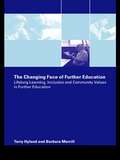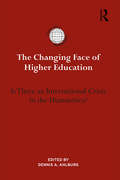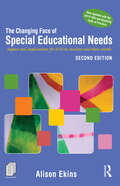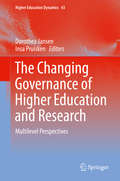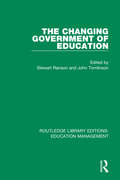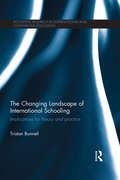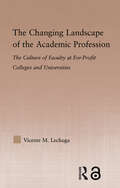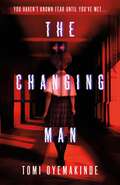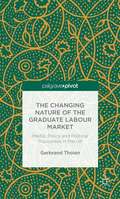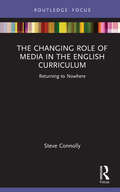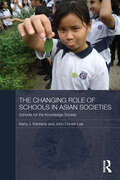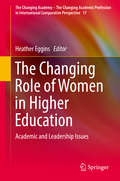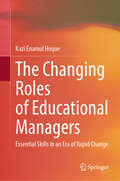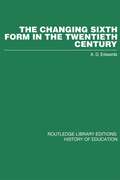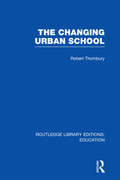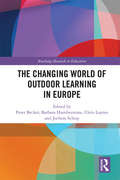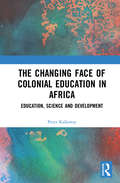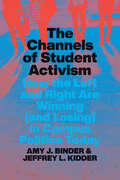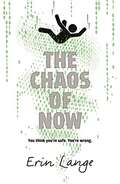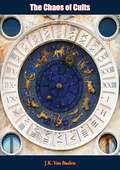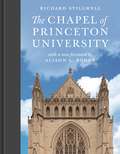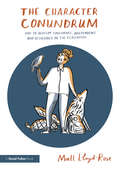- Table View
- List View
The Changing Face of Further Education: Lifelong Learning, Inclusion and Community Values in Further Education
by Terry Hyland Barbara MerrillWhat are the values and policies which are driving the development of Further Education institutions?The rapid expansion and development of the post-compulsory sector of education means that further education institutions have to cope with ever-evolving government policies.This book comprehensively examines the current trends in further education by means of both policy analysis and research in the field. It offers an insightful evaluation of FE colleges today, set against the background of New Labour Lifelong Learning initiatives and, in particular, the links between college and community.This timely investigation of FE and New Labour policy, takes a unique community education perspective to determine whether the social objectives of current policy can be achieved by policy-makers, managers, staff and students in FE institutions.For students, lecturers and educators in the post-compulsory sector, in addition to policy-makers and managers, this is an invaluable source of information on a subject which is still largely under-researched.
The Changing Face of Higher Education: Is There an International Crisis in the Humanities? (International Studies in Higher Education)
by Dennis A. AhlburgOver the last decade, a heated debate has raged in the US and the UK over whether the humanities are in crisis, and, if there is one, what form this crisis takes and what the response should be. Questioning how there can be such disagreement over a fundamental point, The Changing Face of Higher Education explores this debate, asking whether the humanities are in crisis after all by objectively evaluating the evidence at hand, and opening the debate up to a global scale by applying the questions to twelve countries from different continents. Each carefully chosen contributor considers the debate from the perspective of a different country. The chapters present data on funding, student enrolment in the humanities, whether the share of total enrolment in this area is falling, and answer the following questions: What does each country mean by the ‘humanities’? Is there a ‘crisis’ in the humanities in this country? What are the causes for the crisis? What are the implications for the humanities disciplines? Uniquely offering an objective evaluation of whether this crisis exists, the book will appeal to international humanities and higher education communities and policy-makers, including postgraduate students and academics.
The Changing Face of Special Educational Needs: Impact and implications for SENCOs, teachers and their schools
by Alison EkinsFully revised with the requirements of the 2014 new SEN Code of Practice, this second edition of The Changing Face of Special Educational Needs shows teachers, SENCOs and students in teacher training how to respond to the rapidly changing context of special education. This highly practical and accessible text unlocks the often confusing field of special education provision in schools today by: Summarising and clarifying new policy directions as they emerge, in light of the new SEN Code of Practice Suggesting clear, practical activities to bring the theory to life, helping practitioners to review and reflect upon their work; Encouraging critical reflection about existing systems within the school context, considering whether these will remain appropriate and ‘fit for purpose’; Giving opportunities for teachers, SENCOs and senior leaders to contextualise the new changes in terms of the implications for practice in their own school. Including a new chapter on Using Technologies to Support the Development of Inclusive Practices, this text is packed with activities, case studies and points for reflection. It will help the teacher, SENCO, senior leader or advisor to make sense of the rapid pace of change of policy and terminology related to SEN and supports readers in a positive way, emphasising the exciting opportunities that these changes will provide for developing new, innovative and creative working practices. This book will also be essential reading for all SENCOs completing the National Award for SEN Coordination.
The Changing Governance of Higher Education and Research
by Dorothea Jansen Insa PruiskenThis book analyses and describes the effects of the reforms of the European science systems on research. Taking the multilevel governance of the science system into account, the authors describe the effects of the reforms on different aspects: research collaborations and research lines, PhD education, performance profiles, research funding and legal aspects. The first part of the book deals with "PhD education" from an economic perspective. How successful are Research Training Groups and is heterogeneity really a factor of success? What kind of PhD education leads to success? The second part focuses on the interactions of governance and research. How do changes at the national and organisational level influence research cooperation, research lines and research performance? The third part reflects the Europeanisation and Internationalisation of research and research funding. To what extent are research collaborations becoming international? How is the role of European funding agencies changing?
The Changing Government of Education (Routledge Library Editions: Education Management)
by STEWART RANSON and JOHN TOMLINSONOriginally published in 1986. As the keystone of public policy-making and social reform in the post-war period, education has been expected to fuel economic growth, facilitate equality of opportunity, and afford social justice to the deprived. But its vision and objectives are now being questioned in ways which have enormous implications for the management of the service - the traditional balances of autonomy, power and accountability are being redefined. The contributors to this book discuss the effects that this changing environment has had upon a variety of practitioners, and analyse problems and initiatives that are developing within key policy sectors in curriculum and assessment, in the professionalism of teachers, in planning, and in finance. Three major alternative strategies for resolving current dilemmas in the government of education are then reviewed: a further concentration of power at the centre; a community service which would decentralize decision-taking to schools and their local communities; a strengthening of the powers of the local authority. Finally, the editors evaluate these alternatives before proposing their own reconstruction of the government of education.
The Changing Landscape of International Schooling: Implications for theory and practice (Routledge Research in International and Comparative Education)
by Tristan BunnellThe number of English-medium international schools that deliver their curriculum wholly or partly in the English language reportedly reached 6,000 in January 2012. It is anticipated this number will rise to over 11,000 schools by 2022, employing over 500,000 English-speaking teachers. The number of children being taught in these schools reportedly reached 3 million in March 2012. Alongside this phenomenal growth the landscape of international schooling has changed fundamentally, moving away from largely serving the children of the expat and globally mobile business community and Embassies, towards serving the ‘local’ children of the wealthy and emerging middle-class. This has been reflected in the shift away from non-profit ownership by the school community towards ownership by for-profit companies and proprietors. In this book, Tristan Bunnell explores the changing landscape of international schooling and discusses the implications of these changes, both in terms of theoretically conceptualizing the scale, nature and purpose of the field, and in terms of practically serving and administering the growing industry that international education is becoming. The Changing Landscape of International Schooling will be worthwhile reading for researchers, academics and students of international schooling, leaders and teachers in international schools, and those interested in the broader development of international education.
The Changing Landscape of the Academic Profession: Faculty Culture at For-Profit Colleges and Universities
by Vicente M. LechugaThe rapid success of for-profit colleges and universities (FPCUs) only recently has caught the attention of scholars in academe. The continuing expansion of the proprietary higher education sector has lead to fundamental questions regarding the purpose and function of FPCUs. As new technologies continue to emerge, education is becoming of increasing import to employees seeking to upgrade their skills and employers in search of individuals who possess the necessary expertise and training to help their organizations succeed. For-profit institutions challenge traditional notions of the academy--such as shared governance, tenure, and academic freedom--by utilizing administrative practices that more aptly apply to the corporate arena. Moreover, they exclusively employ non-tenure-track faculty members.This study provides a framework for understanding faculty roles and responsibilities at for profit colleges and universities. The author employs a series of in-depth interviews with 53 faculty members, from four for-profit institutions. Utilizing a cultural framework, the study explores the attitudes, beliefs, and perceptions of faculty work with particular consideration given to faculty member's non-tenure-track status, participation in decision-making activities, and academic freedom. The study examines the culture of the faculty work by asking how the profit-seeking nature of the institution affects their efforts inside and outside of the classroom. The author introduces a new component to the cultural framework that illustrates how the close ties between FPCUs and business and industry affect the nature of faculty work.
The Changing Man
by Tomi OyemakindeA teenage girl is pulled into investigating the truth behind her new boarding school’s decades-old legend in The Changing Man, this debut Young Adult speculative mystery by Tomi Oyemakinde.Face front. Watch your back. BE BRAVE.Despite Ife Adebola being in the Urban Achievers scholarship program at Nithercott School, her parents can barely afford the tuition. No matter how much the prestigious boarding school tries to pull her in,or who wants to be friends with her, like her classmate Bijal, Ife is determined not to get caught up in any of it.But when another student begins acting out of character, Ife can’t help but wonder if there’s more going on at Nithercott than she realizes. Could there be any truth to the school’s decades-old legend of the ChangingMan? Is there any connection to the missing older brother of her classmate, Ben?As more questions arise, Ife has no choice but to team up with Ben and Bijal to investigate. But can the trio act quickly enough to uncover who—or what—is behind everything, before they become the Changing Man’s next victim?
The Changing Nature of the Graduate Labour Market: Media, Policy and Political Discourses in the UK
by Gerbrand TholenThe assumptions made in the media regarding graduate skills and occupations are no longer valid within the changing educational context. This book traces seven key trends that shape the graduate labour market and reveals that their effects contradict the conceptualisation of the graduate labour market which dominates media and policy discourses.
The Changing Role of Media in the English Curriculum: Returning to Nowhere
by Steve ConnollyThis book analyses and explains the role that the study of media texts has played in English curricula across the last 30 years, exploring the implications of these changes for teachers and students. Presenting a documentary analysis of the key evidence surrounding the history of media texts within English, the book focuses on how media has been characterized in the subject of English in the UK National Curriculum, while also reflecting on the position of media texts in other English-speaking National Curricula such as Australia and New Zealand. It dissects the changing role of media texts in English, considering media texts which range from newspapers and print adverts, films and TV through to digital, web-based and multimodal texts. The book charts the history of this part of English and considers what it can tell us about the nature of curriculum and English education more broadly. Speaking to important issues of curriculum in education, this book will be key reading for researchers, students and practitioners of media education, English education and the history of education.
The Changing Role of Schools in Asian Societies: Schools for the Knowledge Society
by Kerry J. Kennedy John Chi-Kin LeeWalk into a classroom in Tokyo, New York, London or Rotterdam, and the similarities in structure, activity, purpose and style will outweigh differences in language, dress and ethnic characteristics. Learning is regulated and rationed, teaching is a process or one-way transmission of knowledge, students need to be docile and conformist, assessment needs to sift and sort the bright from the not-so-bright, and rewards will be given to those who successfully negotiate this regime. But are these the kinds of places that can meet the needs of the ‘net generation’? The Changing Role of Schools in Asian Societies is concerned with the debate about the nature of modern schooling in Asia. Traditionally schools are historical constructions reflecting the social, economic and political needs of the societies that invest in them. As Asia faces the challenges posed by the ‘knowledge economy’, its schools have taken on a new and quite different importance. This informative book outlines the broad policy contexts in which these transformations are taking place and the practical strategies that are needed to meet this objective. The authors argue that the future of Asian societies depends on a transformation that requires a fundamental restructuring of schools as we know them while maintaining their long-held cultural values. This valuable insight: provides an overview of educational issues in Asian societies establishes a broad theoretical framework in which these issues can be understood contextualizes issues by providing country case studies acknowledges the important role of culture influencing educational priorities. It should be of interest to all those working in education policy and comparative education.
The Changing Role of Women in Higher Education
by Heather EgginsThis book sets out to examine the changing role of women in higher education with an emphasis on academic and leadership issues. The scope of the book is international, with a wide range of contributors, whose expertise spans sociology, social science, economics, politics, public policy and linguistic studies, all of whom have a major interest in global education. The volume examines the ways in which the leadership role and academic roles of women in higher education are changing in the twenty first century, offering an up-to-date policy discussion of this area. It is in some sense a sequel to the earlier volume by the same Editor, Women as Leaders and Managers in Higher Education, but with very different emphases. The pressures now are to respond to the demands of the technological age and to those of the global economy. Today there are more highly qualified and experienced female academics, and more expectation of their gaining the highest posts. Challenges still remain, particularly in terms of the top posts, and in equal pay. The discussion of global policy issues affecting the role of women in higher education is combined with country case studies, several of which are comparative. Together they examine and unpack the particular situations of women in a wide range of higher education systems, from Brazil to the US to Europe to Africa and the Far East, noting the shift towards more flexibility, more personal choice and a greater acceptance by society of their abilities. This volume is a useful and influential addition to published work in this area, and is aimed at the intelligent general reader as well as the scholar interested in this topic.
The Changing Roles of Educational Managers: Essential Skills in an Era of Rapid Change
by Kazi Enamul HoqueThis book highlights the key competencies and coping mechanisms needed by educational managers in an era of rapid change on a national and international scale. It also posits and discusses how the heads of educational organizations, often classified as leaders, should be re-categorized as managers instead due to their broad range of duties and obligations. Finally, this book also provides a collection of essential tools, mechanisms, and principles for educational managers and practitioners at all levels in education.
The Changing Sixth Form in the Twentieth Century
by A D EdwardsOriginally published 1970.This book traces the history of the sixth form in Britain from the first decade of this century and follows the continuing debate over its function to the present day. It analyzes what kind of organisation is required to meet the demands of rising numbers and questions whether the needs of older adolescents can be better met in the "new" sixth form of the comprehensive school or in a separate type of sixth-form college. The book also discusses the balance between general and specialized courses.
The Changing Urban School (Routledge Library Editions: Education)
by Robert ThornburyThe author takes a long look at what goes on in schools, and the roles played by people specifically concerned with them: but finally the problems of the school are seen as indissolubly bound up with the changes that have overtaken urban life. The school cannot be isolated, teachers, administrators, planners and parents must actively co-operate in making the school work in society and a society which works for the school. Nothing other than such a total vision, he concludes, will enable us to achieve normal educational goals. Robert Thornbury writes out of fifteen years experience of the urban school and of the problems not only of Britain but also those sometime similar, often more acute, of other countries, in particular the United States and Australia. The need for a total urban strategy is worldwide. His point of view is broad-based but his sympathies lie most of all with the hard-working teacher who stayed on in the urban classroom. It is a book for teachers therefore, but also, by its own argument, for all concerned with the future of the inner-city and the reordering of education.
The Changing World of Outdoor Learning in Europe (Routledge Research in Education)
by Barbara Humberstone Peter Becker Chris Loynes Jochem SchirpThe Changing World of Outdoor Learning in Europe sets out to provide a comprehensive analysis of the economical and political changes that have occurred in European outdoor culture in the preceding two decades, from a diverse range of perspectives including institutional, theoretical, national and educational views. The book looks at how outdoor education has been transformed into an increasingly global field where established and influenced practices have been introduced into modernising and democratising nations. With contributions from the members of the board of the European Institute of Outdoor Adventure Eduation and Experiential Learning and representatives of the networks that stand behind it, this unique book provides thorough factual analyses and examinations of outdoor learning that have never been presented before. The book contains contributions from across Europe, with authors from the UK, Germany, Finland, Sweden, Slovenia, Poland, Norway and the Czech Republic. Chapters within the volume by non - European authors provide another perspective on the European story in a wider context. As a whole, the book will stimulate the ongoing debate about the nature, function and organisation of outdoor education around the globe. The Changing World of Outdoor Learning in Europe will be of great interest to academics, researchers and postgraduate students in the fields of outdoor education, leadership and recreation; and outdoor, sport, environmental and leisure studies. It should also be essential reading for those involved in outdoor organisations in Europe and worldwide.
The Changing face of Colonial Education in Africa: Education, Science and Development
by Peter KallawayThe Changing Landscape of Colonial Education in Africa offers a detailed and nuanced perspective of colonial history, based on fifteen years of research, that throws fresh light on the complexities of African history and the colonial world of the first half of the twentieth century. It provides an analytical background to history of education in the colonial context by balancing contributions by missionary agencies, colonial government, humanitarian agencies, and scientific experts. The book offers a foundation for the analysis of modern educational policy for the post-colonial state. It attempts to move beyond clichés about colonial education to an understanding of the complexities of how educational policy was developed in different places at different times while giving credence to arguments which see schooling as a form of social control in the colonial environment. The book will be essential reading for academics, researchers and policy makers looking to better understand colonial education and contextualise modern developments related to the decolonising African education. It is intended to provide an essential background for policy makers by demonstrating the significance of a historical perspective for an understanding of contemporary educational challenges in Africa and elsewhere.
The Channels of Student Activism: How the Left and Right Are Winning (and Losing) in Campus Politics Today
by Amy J. Binder Jeffrey L. KidderAn eye-opening analysis of collegiate activism and its effects on the divisions in contemporary American politics. The past six years have been marked by a contentious political atmosphere that has touched every arena of public life, including higher education. Though most college campuses are considered ideologically progressive, how can it be that the right has been so successful in mobilizing young people even in these environments? As Amy J. Binder and Jeffrey L. Kidder show in this surprising analysis of the relationship between political activism on college campuses and the broader US political landscape, while liberal students often outnumber conservatives on college campuses, liberal campus organizing remains removed from national institutions that effectively engage students after graduation. And though they are usually in the minority, conservative student groups have strong ties to national right-leaning organizations, which provide funds and expertise, as well as job opportunities and avenues for involvement after graduation. Though the left is more prominent on campus, the right has built a much more effective system for mobilizing ongoing engagement. What’s more, the conservative college ecosystem has worked to increase the number of political provocations on campus and lower the public’s trust in higher education. In analyzing collegiate activism from the left, right, and center, The Channels of Student Activism shows exactly how politically engaged college students are channeled into two distinct forms of mobilization and why that has profound consequences for the future of American politics.
The Channels of Student Activism: How the Left and Right Are Winning (and Losing) in Campus Politics Today
by Amy J. Binder Jeffrey L. KidderAn eye-opening analysis of collegiate activism and its effects on the divisions in contemporary American politics. The past six years have been marked by a contentious political atmosphere that has touched every arena of public life, including higher education. Though most college campuses are considered ideologically progressive, how can it be that the right has been so successful in mobilizing young people even in these environments? As Amy J. Binder and Jeffrey L. Kidder show in this surprising analysis of the relationship between political activism on college campuses and the broader US political landscape, while liberal students often outnumber conservatives on college campuses, liberal campus organizing remains removed from national institutions that effectively engage students after graduation. And though they are usually in the minority, conservative student groups have strong ties to national right-leaning organizations, which provide funds and expertise, as well as job opportunities and avenues for involvement after graduation. Though the left is more prominent on campus, the right has built a much more effective system for mobilizing ongoing engagement. What’s more, the conservative college ecosystem has worked to increase the number of political provocations on campus and lower the public’s trust in higher education. In analyzing collegiate activism from the left, right, and center, The Channels of Student Activism shows exactly how politically engaged college students are channeled into two distinct forms of mobilization and why that has profound consequences for the future of American politics.
The Channels of Student Activism: How the Left and Right Are Winning (and Losing) in Campus Politics Today
by Amy J. Binder Jeffrey L. KidderAn eye-opening analysis of collegiate activism and its effects on the divisions in contemporary American politics. The past six years have been marked by a contentious political atmosphere that has touched every arena of public life, including higher education. Though most college campuses are considered ideologically progressive, how can it be that the right has been so successful in mobilizing young people even in these environments? As Amy J. Binder and Jeffrey L. Kidder show in this surprising analysis of the relationship between political activism on college campuses and the broader US political landscape, while liberal students often outnumber conservatives on college campuses, liberal campus organizing remains removed from national institutions that effectively engage students after graduation. And though they are usually in the minority, conservative student groups have strong ties to national right-leaning organizations, which provide funds and expertise, as well as job opportunities and avenues for involvement after graduation. Though the left is more prominent on campus, the right has built a much more effective system for mobilizing ongoing engagement. What’s more, the conservative college ecosystem has worked to increase the number of political provocations on campus and lower the public’s trust in higher education. In analyzing collegiate activism from the left, right, and center, The Channels of Student Activism shows exactly how politically engaged college students are channeled into two distinct forms of mobilization and why that has profound consequences for the future of American politics.
The Chaos Of Now
by Erin Jade LangeWhen Jordan Bishop set himself on fire at Haver High school as a result of internet bullying, it triggered a nationwide crackdown. New laws empower teachers to become cyber snoops in case of abuse on social media. For teen hacker, Eli Bennett, the laws put fundamental freedoms at risk. And he's not alone in thinking this. Approached by two mysterious hackers, Eli is recruited into a group that wants justice for Jordan the way Jordan would've wanted it. But what starts as a bit of fun to rile the cyber snoops soon spirals out of control. Revenge on Jordan's bullies could be classed as bullying itself... At best, Eli's school career is in jeopardy, at worst, once more lives are at risk.
The Chaos of Cults: The Chaos Of The Cults
by J.K. Van BaalenThe 1952 edition of this popular Christian oriented look at cults, called by the publisher: "a comprehensive study of the most significant cults that challenge orthodox, evangelical Christianity." It includes chapters on such "cults" as Astrology, Spiritualism, Theosophy, Rosicrucianism, Unity Church, Baha'ism, Swedenborgianism, Mormonism, etc.
The Chapel of Princeton University
by Richard StillwellThe classic guide to one of America's architectural treasures—now with magnificent new color photos and a foreword by Princeton's dean of religious lifeLike the medieval English cathedrals that inspired it, the Princeton University Chapel is an architectural achievement designed to evoke wonder, awe, and reflection. Richard Stillwell's The Chapel of Princeton University is the essential illustrated guide to this magnificent architectural and cultural landmark.Now with new color photos throughout, The Chapel of Princeton University traces the history of the chapel and describes its architecture, sculpture, woodwork, and furnishings. Stillwell knew the building from its planning stages through its construction, dedication, and long use. In this book, he offers unique insights into the vision of architect Ralph Adams Cram and the artistry of Charles J. Connick, who designed the chapel's breathtaking cycle of stained-glass windows. Stillwell's thoroughly researched account of the glorious stone, wood, and glasswork gives readers and visitors an opportunity to enjoy the chapel as both an aesthetically beautiful structure and a moving religious statement. Stillwell reveals how the building's composition is meant to provide spiritual access to as many seekers as possible and instill in them an extraordinary message of hope.Featuring a foreword by Alison Boden, Princeton's dean of religious life, The Chapel of Princeton University is a guided tour of an inspiring structure that has served as the spiritual home to one of America's leading universities.
The Character Conundrum: How to Develop Confidence, Independence and Resilience in the Classroom
by Matt Lloyd-RoseThe Character Conundrum is a practical guide for developing confidence, independence and resilience in primary and secondary classrooms. Tackling the hotly-contested question of what role schools can play in developing ‘character', the book untangles the big debates in this area and outlines how teachers can support their pupils to develop the skills and mindsets that will help them to thrive academically. Based on a combination of ground-level investigations and academic research, the book offers a simple, evidence-based approach that can be implemented at every level of school life. The key to this approach is being deliberate and consistent: knowing which mindsets, skills and habits you’re trying to develop, and planning the details of your classroom culture, relationships, routines and instruction so that they align and combine to address your aims. When you do this, the author contends, seemingly minor changes to your practice can have a major effect on pupils. The book contains a step-by-step guide to bringing this approach to life in your classroom, including a framework of pupil outcomes, a flowchart of teacher actions, classroom case studies and a wealth of tried-and-tested strategies from primary and secondary schools across the UK. A lack of confidence, independence and resilience is a major barrier to learning for many pupils and dilutes other efforts that schools make to support them. The Character Conundrum argues that teachers can help pupils develop these characteristics in any school context and illustrates how they can do so within and through their day to day teaching. Written with passion and clarity, it will be essential reading for primary and secondary teachers, as well as policy makers with an interest in ‘character’, grit and resilience, and any education professionals committed to giving students greater ownership of their learning and setting them up to succeed.
The Character of Curriculum Studies
by William F. PinarAssembles essays addressing the recurring question of the 'subject,' understood both as human person and school subject, thereby elaborating the subjective and disciplinary character of curriculum studies.
